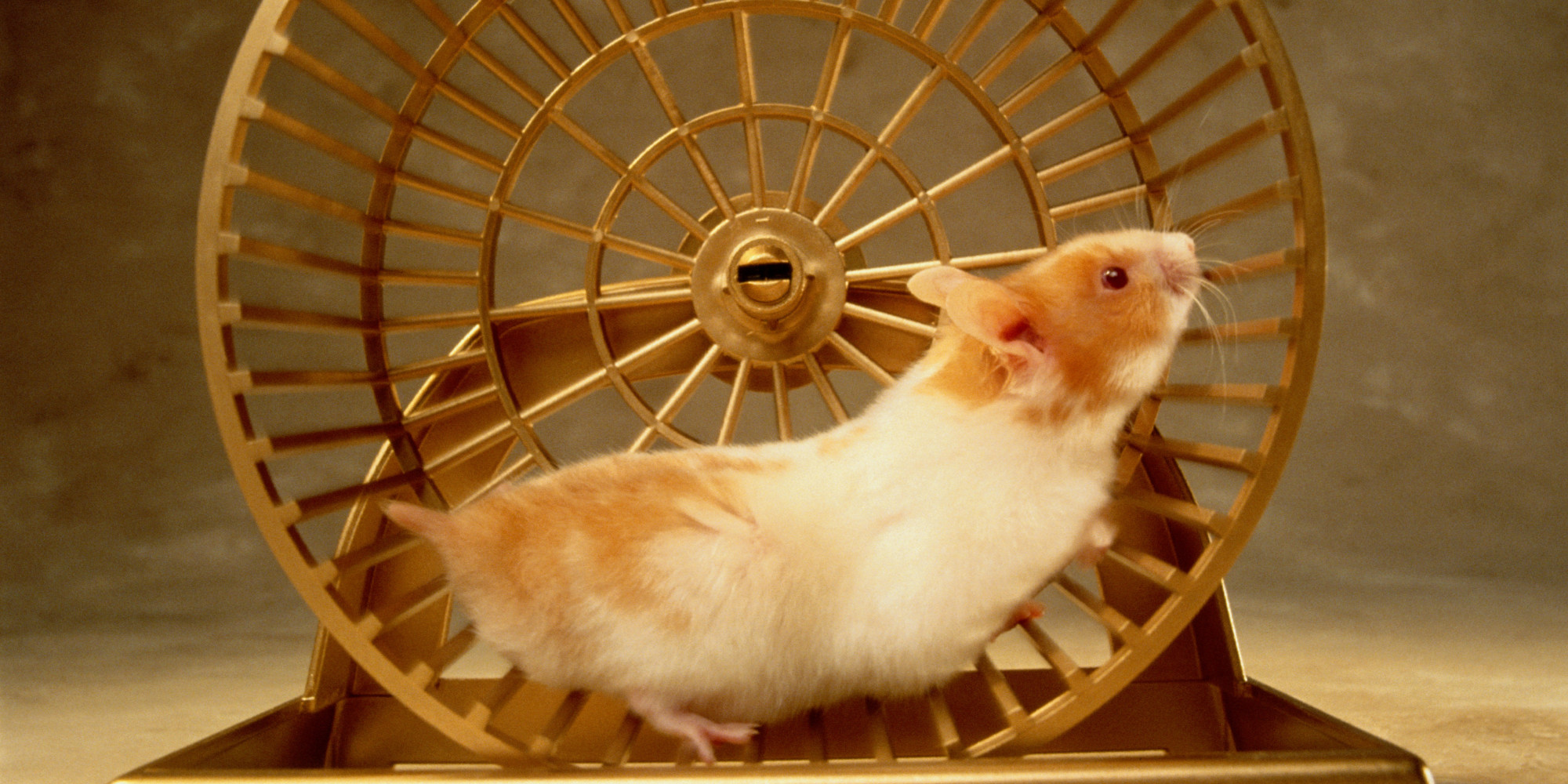


You know that feeling?
That oppressive feeling like you've been jinxed or cursed?
Because you go through the same annoying cycle every single day.
You wake up at 3 am because you can't stop fretting about your heavy workload. This turns into severe depression at 6:50 am when you leave the house. Then more depression and anxiety at 7 am as you think about the day ahead.
And then after the day's stress, You feel compelled to work 3 to 4 hours overtime because everyone seems to have their eye on you.
Day in, day out, you work so hard that this becomes the only life you know.
And the result...
Because you believe that the only two options you have in life are to...
Option 1: Put up with dreadful work patterns. And accept that this will be your life forever
Or...
Option 2: Permanently go off sick and live off government handouts forever.
But...
Shreeeiiiiiiiik.. STOP.

That's not really true, is it?
As you've hopefully discovered, by now, from articles 1 & 2 in this email series...
There is one more super effective option for winning over this paralyzing cycle which most people don't even know exists.

In yesterday's article, I revealed The MAD System for supercharging your ability to cope effectively at work irrespective of your anxiety or depression.
As you saw in the last two articles, your inability to cope has got nothing to do with your weaknesses.
Your strengths are the roots of all your mental health struggles.
And to set you in the right direction for a better emotional future...
In today's article, I will be revealing the four most common problematic strengths.
These strengths have trapped 99% of the clients I've seen over the last 20 years in relentless emotional torture. And I can guarantee that at least one of these strengths is at the core of your work-based problems.
Once you know what these four strengths are, all you've got to do is to apply The Mad System just like I showed you yesterday.
And you'll be set.
No Joke! Applied successfully, you could easily find yourself coping better emotionally within the next two weeks.
So on that note, let's get started. Here's the first trap.

“But what else can I do! I just have to keep going.”
Imagine being a single parent with mouths to feed, bills to pay and chores to do.
Do you get any time to stop and take a brake?
You’ll most likely feel like you have no option but to keep on going. Because if you STOP! Your whole world will crumble on top of you.
So you literally become like a hamster in a spinning wheel.
Running... Running... Running
Non stop.
Sounds reasonable right
And it's true...
The ability to keep on going despite whatever life throws at you is certainly a good strength to have.
But here’s the deal.
If all you do is to just keep powering on because it is either that or fall apart…
You’ll never have any time to learn the necessary skills you must acquire to cope better with the multiple difficulties you've got to juggle.
And the result...
You'll always feel broken by your emotionally charged problems both at home and at work.
The better approach is to stop ever so often,
And sit down with a pen and paper.
And like a business tycoon managing his multi-million business, draw out a plan for how you intend to move forward with your life without falling for the same mistakes.
I usually advice my client's to do this once a week.
You see, the truth is that your life is way more valuable than any multi-million dollar business. So refuse to fall for that trap of treating your life like it's something you don't have to plan for.
Remember the saying the fastest road to madness is to keep doing the same things over and over. So use the MAD system as the guide to help you determine the traps you have been cycling through.
This way you can become your own therapist and instead of stagnating all the time, you actually feel like you are getting somewhere with life.
Moving on to the next trap...

I have a question for you.
When you're struggling, can you comfortably tell people at your workplace that you are not coping?
Most likely not.
Because, what will they think about you after that? Surely you've got to protect yourself from the stigma?
And yes it's true...
It's a great strength to be able to protect yourself from stigma. Especially at work.
But what if I told you that 99% of my clients had their initial meltdown because they develop a very good ability to protect themselves from stigma attacks in this way.
Why would this be the case?
It's because hiding and denying your emotional struggles drains your mind and body of the energy and resources it needs for coping.
You see already, if you are struggling with anxiety, depression or stress, chances are that you will be spending loads of your time in deep difficult thinking. Which already saps your energy.
In fact, to your body, an hour of thinking like this is like three days hard labor. That's the amount of energy thinking too much can cost you.
Now, add that to having to hide how you really feel all the time, this will quadruple the energy drain you are experiencing.
And the end result…
You carry an ever present burden that sucks the soul out of you. Locking you in a self-defeating downward spiral. And this makes you second guess yourself for life.
To break out of this trap, you've got to take a steps towards helping yourself feel liberated about not coping.
You've got to open up about this.
Granted this will be difficult, but take it from me, opening up about my own struggles with anxiety has been massively liberating.
I used to think that people would think bad of me if they knew I struggled, but ironically the opposite was what happened. After I began to open up, I was surprised that instead of pushing me away, people felt drawn to me.
Why?
It's because everyone has weaknesses, everyone struggles. It easier to relate with someone who isn't perfect than to relate with someone who has everything going right in their life. So when people learn that I struggle they feel empowered to open up to me.
Yes there are still some people who seem clueless, but now I know that these people are themselves struggling. And because they are not yet ready to accept this, they find my freedom with my own mental health issues threatening.
Moving on to the third stress trap…

“I don’t need to see you...”
She said aggressively.
“I don’t see how talking to you will solve my real life problems.”
Barbara, a lady referred to me for her depression, adamantly told me.
She believed her depression would be non-existent if she could just get a good Job that paid enough to meet her needs.
A few weeks later, she was fortunate to get the exact job she’d dreamed for. But, after being in the job for some time, she came back to me feeling rather perplexed.
She wasn't feeling any happier.
Why was this so?
You see, the drive to achieve Is a positive strength to have.
You are driven to, get a house, get a good job, get a promotion, get an academic degree. And although this is great, because it can boost your confidence, give you a buzz and make you feel materially comfortable in life.
The only problem...
The good feeling you get from this will never last.
All the achievements you have amassed fade in their importance as you set your eyes on the next shiny new thing. So, you're forever driven to achieve your next fix.
But like a deceptive mirage.
You keep thinking if I get this next thing sorted I'll be fine. But you get there only to find that the goal post has shifted and you are never really ever sorted. Until you drive yourself to the ground and have to take sick days off with no end.
This is the negative impact created by the drive to achieve.
To break free of this trap, you've got to spend at least 20% of your time reviewing your achievements.
Yes you might initially feel like you are being proud and pompous for doing this. But trust me, this exercise is crucial for maintaining your mental stability.
Learning to acknowledge and live off your past achievements builds a crucial foundation for self-acceptance and for feeling good enough as a person. Both at work and in your relationships.
The more you do this the more your confidence will soar high.
So all you gotta do here is to keep a diary of the things you've achieved.
Little things and big things.
Don't just write down the big things like got a better paying job.
The surprising thing is that keeping a diary of the little things far surpasses the big things in the impact this exercise has on building your sense of self-worth.
So once you have this diary of achievements written out, just pop it out whenever you are feeling bad about yourself and read through them. Continue reviewing them until you sense yourself feeling better.
This is how you can stop acquisition trap from destroying enjoyment in your life.
Now, let’s head on to the fourth and most dangerous of the four strengths.

Ever heard of the saying... "Out of sight is out of mind."
This is one of the reasons I love babies, They forget about anything that is not right in front of them.
But what has babies got to do with improving your ability to cope at work?
You see, It's is a powerful strength to be able to forget difficult experiences and move on.
If things are going so well at work , you don't want to spoil things by dragging up all the bad stuff again. That will make you feel depressed or anxious all over.
The Insidious Baby Trap is empowered by your "out of sight is out of mind" strength.
And it ensnares you by training you to gradually feel vulnerable to uncontrollable situations.
Here is a somewhat related example that occurs in relationships that clarifies why this trap can create catastrophic problems.
So, at the beginning of the relationship there’s a lot of love in the air between the couple. Then after a few months, they quarrel, but no one thinks anything of it. Because the argument get's swept under the carpet and they are both back to loving each other again.
What this couple do not realize is that "a problem seed" has been sown. And they just lost a vital opportunity to learn how to cope better with the problem.
This cycle repeats itself over and over until ten years down the line, they are both wanting to kill each other, and wondering how things got this bad.
This is the forgetful baby trap in full blown action.
In your situation, the problem could be between you and your work mates, or between you and your manager.
Initially, The problem eases off slightly, fooling you into thinking things are all better now. Then as you carry on with your life...BAMMMM!!!
The problem floors you again!
And then anxiety or depression smacks you down again!
So you avoid this trap by treating your problems like rats.
No one wants a rat infestation.
You see, if you saw a rat in your home and just shrugged it off, thinking to yourself...
It's gone now...
Maybe into the wall or into the roof, so there's nothing I can do about it.
What will happen is that those rats will grow and infest your house till you are seeing big chunky rats everywhere zooming across your floor in the bathroom, bedroom, kitchen and on your dining table.
My point...
Even if a problem seems to have taken a backseat, It's important to understand why the problem existed in the first place.
It is crucial to understand the exact steps to take to prevent the problem from regenerating and growing bigger.
So when the problem is no longer in your face, use that time to develop your battle plan so that when the problem arises again you are ready to stop it in its tracks.
Hopefully, you can see how drastically poisonous these 4 stress traps are to your emotional well-being.
Now that you know all that, here's another crucial question...

Have you felt trapped in a job or a relationship.
You've felt shackled by unfavourable situations that you see little way out of. And like a stuck rusted screw that refuses to budge, those situations can leave you discouraged because they feel permanent.
Often though, it is not that the difficulties are permanent. They just need the rust dusted off to loosen things up and empower you to move forward with your life.
How do you dust the rust off?
By examining the seemingly unsalvageable situations with brand new eyes. And by moving in new directions, considering unexplored solutions and redefining yourself.
How will this help?
You see, the circumstances around us are always in flux. Some changes (positive or negative) are dropped on us and some we create
But as humans, we are all prone to getting intimately comfortable with the way we do things. We develop strategies for surviving life. Strategies which were initially effective for the challenges we had to face. However, as life moved on, our coping strategies remained stagnant.
And like rust, our strategies begin to make us feel stuck.
The effective way to approach coping is to always keep your coping strategies refreshed. Consciously matching your coping strategies to the changes you are experiencing in life.
Not doing this is like relinquishing your right to have a say in the direction your life takes.
What’s the best way to tweak your coping strategies?
It’s by becoming a master at…
Because the truth is...
You don't know how much time you've got left. No one knows what's round the corner.
You don't have to remain in this soul draining state every day. It's high time to get out of this emotional mess and start enjoying life as you are meant to be doing.
So...
Choice 1: You can take everything you have learnt over the last 3 days and do nothing with. Which might just mean you'll still be struggling to cope with anxiety and depression in your work ten years from now.
Choice 2: You can take what you have learnt and do it all on your own. You can take the Mad system and apply it in the way I have shown you. This works tremendously well. You just need to persevere through a lot of trial and error as you pinpoint the correct strengths to focus on.
Choice 3: You can take what you’ve learnt and then follow my step plan in the program I have put together for you. You can read about it in the next article below. This practical plan will help take all the guesswork out of the equation. This way, you don't waste years fumbling through mistake after mistake.
If you'd like this plan. And you'd like to learn reliable coping skills that can empower you to move forward in your life without fear?
Then, just click the button below and read the next article to find out more.
That’s all for now folks.
Take care and I'll talk with you soon.
Adewale (StressTherapist)